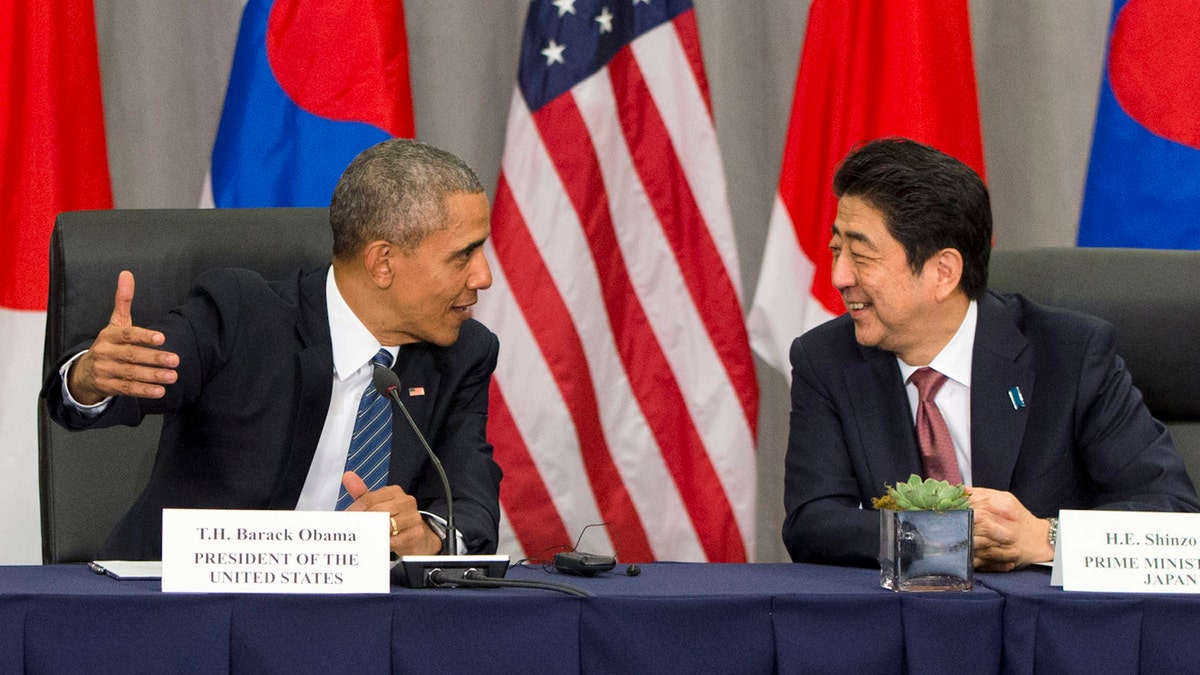
FILE - March 31, 2016: President Obama speaks with Japanese Prime Minister Shinzo Abe during their meeting at the Nuclear Security Summit in Washington. (AP Photo/Jacquelyn Martin) (The Associated Press.)
President Obama will become the first sitting president to visit Hiroshima when he travels to Japan later this month to attend the G7 summit. While it’s unlikely he’ll apologize for the decision to drop an atomic bomb on the city in 1945 (nor should he), he will certainly be mending fences. The Japanese today are appropriately dismayed and anxious at what they’re hearing from Donald Trump, the presumptive Republican presidential nominee.
Among the many odd pronouncements made by Trump during the presidential campaign this year is this often-repeated reference to Japan: “They’re killing us!” He’s saying Japan’s economic success comes at America’s expense.
Far from killing us, Japan is making key investments in our economy. Japanese auto and truck manufacturing in the United States supports nearly 1.5 million American jobs. Overall, in 2015, the Japanese invested $44 billion here. That’s more than Japan put into all of Asia or Europe. Japan’s total direct investment in the U.S. amounts to more than $400 billion, or nearly four times its investment in China.
Japan is not killing us. To the contrary, we’re killing Japan, our staunchest ally in Asia. We aren’t pushing hard enough for an important regional trade deal, we’re taking too casual an attitude toward China’s aggressive behavior, and we’re declining to extinguish the flames of a regional controversy more than 70 years old.
Many Japanese are disappointed by the unfulfilled promise of President Obama’s “pivot to Asia,” a rebalancing meant to recognize that most of the economic and political history of this century will be written on that continent. A key piece of the new policy, the Trans-Pacific Partnership, is in jeopardy. The TPP trade deal has come under attack from the major U.S. presidential candidates – not just Trump and Bernie Sanders but even Hillary Clinton. And the U.S. hasn’t answered China’s provocative actions over disputed islands in the South China Sea forcefully enough.
There’s another area where the U.S. can show solidarity with Japan at a critical time. The issue is the “comfort women,” mainly Koreans, who were abused during World War II. Under a 1965 agreement, Japan paid $800 million in grants and soft loans to South Korea as compensation for colonial rule from 1910 to 1945. South Korea “agreed never to make further compensation demands,” according to a UPI report in 2005, on the basis of documents that had just been declassified. The funds from Japan were used by South Korea for economic development rather than for paying victims.
In late December, South Korea and Japan reached an agreement that attempts to resolve the comfort women dispute. Japan supplied $8 million in government funds to support women who were used for sex by Japanese soldiers, and Prime Minister Shinzo Abe issued an apology. Japan has given South Koreans money and apologies before, but the issue hasn’t died. Prime Minister Abe went much farther than his predecessors, but many South Koreans still aren’t satisfied.
The story of the comfort women has often been distorted by Japan’s former adversaries in the war, and exploited for political purposes. A 2013 book by an academic, Park Yu-ha, challenged what she called “the common knowledge” about the abuse. The backlash was fierce. In an appalling assault on freedom of speech, a court ordered the book censored in 34 sections, Park was put on trial for criminal defamation charges, and there are moves to fire her from her professorship at Sejong University in Seoul.
“In her book,” said the New York Times, “she emphasized that it was profiteering Korean collaborators, as well as private Japanese recruiters, who forced or lured women into the ‘comfort stations,’ where life included both rape and prostitution. There is no evidence, she wrote, that the Japanese government was officially involved in, and therefore legally responsible for, coercing Korean women.”
Other historians have drawn similar conclusions. Prostitution and war have long gone hand in hand. In fact, in 2014, a group of South Korean women sued their own government claiming that it trained them and worked with pimps to run a sex trade for American soldiers in the 1960s and 1970s.
In addition, Vietnamese women are coming forward to say they were raped by South Korean troops during the Vietnam War, and a Change.org petition calling for an apology by South Korea’s president, president, Park Geun-hye, has gathered more than 34,000 signatures. Former Minnesota Sen. Norm Coleman wrote on FoxNews.com last October that South Korean troops “sexually assaulted thousands of young women, some as young as 13 and 14 years of age. Many of these women bore children as a result of these assaults. Today, between 5,000 and 30,000 children of mixed Korean-Vietnamese ancestry, called the ‘Lai Dai Han,’ live at the margins of Vietnamese society.”
Meanwhile, despite the whirling political animosity, Prime Minister Abe decided to try to put an end to the comfort women controversy, in part because animosity has spilled over into economic and security relations between the two countries. Between 2012 and 2014, trade between the nations dropped 17 percent; Japanese travel to South Korea fell by one-third. South Korea has leaned toward China on its South China Sea claims, to the dismay of Japan.
North Korea has tried to exploit the divisions between Japan and the South. After the agreement was reached in December, a pro-North Korean group in Japan said that “there is no more humiliating diplomacy than to reach such a deal with Japan.”
The U.S. played an important role in securing the comfort women agreement, but the administration needs to take a stronger stand in resolving a nasty spat that’s been going on for three-quarters of a century. The economic and national-security stakes are too high for this battle over history to continue. It’s killing us.
